In mid-July, Phil Galfond played in the WSOP Online tournaments, which were open to anyone who was in the states of Nevada and New Jersey. Phil streamed his sessions, opening cash tables at the same time. However, there was not enough action at high stakes, and one evening Galfond tweeted :
Hello friends. I'm on the air, let's hunt for bracelets. I also sit alone at the PL10K and PL20K tables. Anyone want to play with a constantly distracted streamer?
None of the regulars dared to sit against the PLO legend that evening. But Phil still got some action: soon a player with the charitable nickname 'ChristIsLord' appeared at the PLO10K table. ''Dudes, does anyone know who Christ is? Is he the Lord? No, that's Jesus, I know, but who is this'', Galfond was surprised, starting the match. In the chat, viewers made several assumptions (all of which were wrong).
Phil, of course, could not have known that his tweet was seen by an amateur PLO player working as a dealer in Vegas. He decided to take a shot by challenging the poker legend, and a month later he posted a match report on his YouTube channel, calling the video ''WSOP dealer puts up his salary against Phil Galfond.''
The video turned out to be very positive. It was produced in such a way that you can see hands with open cards and listen to the commentary of both players. Everyone was able to see how a determined dealer used tricks against his idol, which he learned from the man himself – and also manages to outwit him in the key hand of the match.
The video begins with some funny dialogues: before the match, ChristIsLord began to feverishly sell shares to friends who were online on discord.
– Galfond sitting alone on $50/$100. Do you want to buy half of the action? If yes, then I'm playing.
– What is the buy-in, $10k or what? Lol! NO. THIS IS GALFOND.
Another friend of the blogger was more adventurous:
— Will you take 50%?
— Wooow. Maybe you just play 1 hand, win the blinds and then you canl tell everyone that you made a profit off Galfond? Okay, how long do you want to play?
Until I win $5,000 or lose $20,000.
So you're offering me $10k to lose? Hmmm, harsh. Okay, I'll take 25%! So I can lose $5k and win $1k. Playing against the best Omaha player in the world… Sounds good, I believe in you!
Another friend bought 10%, another 7% went in pieces. Final tally:
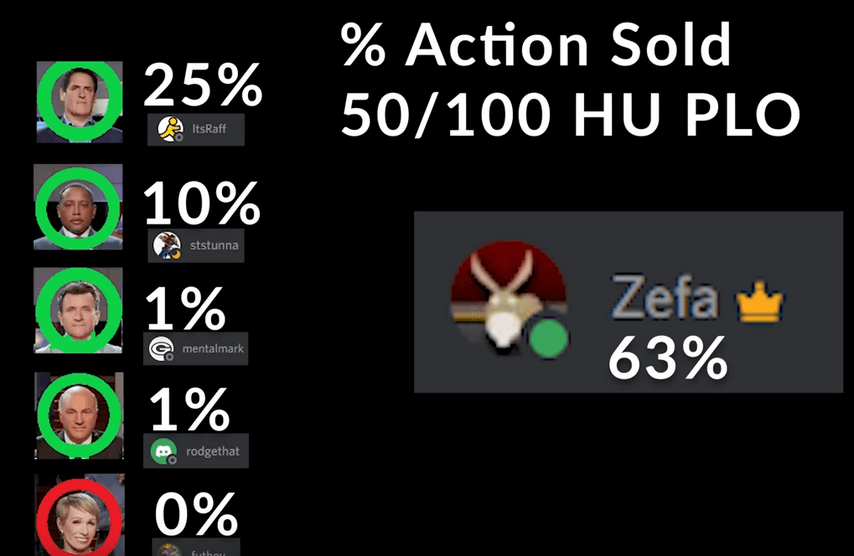
So, the match began. The brave dealer turned out to be no stranger to PLO: he used to play $2/4, $3/$6 and even $5/$10 limits. This explains why he had money in his account to be able to sit at the PLO10K table.
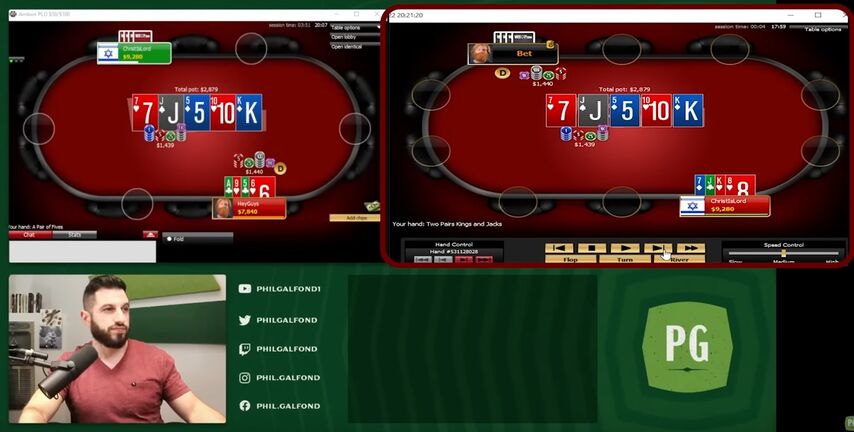
The flop went check-check, on the turn ChristIsLord bet $420 into a $600 pot, Galfond called. On the river, Phil bet the pot and got top two pair to fold.
Galfond: We'll have to bluff the river, even though we don't want to. But I have the very bottom of my range and blockers for the ace and nine, so I need to put in a bet, representing Q9 and AQ.
ChristIsLord: I checked the river, although the block bet looked good too. Phil bluffed me, but I like my pass. Would pay if I had an ace, a nine, a queen, or no hearts.
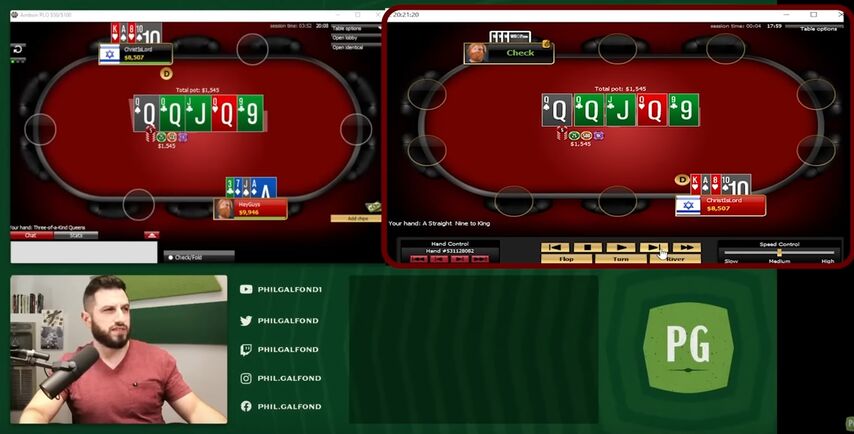
On the flop and turn, ChristIsLord bet small, 25% of the pot and Phil paid both. River played check-check.
ChristIsLord: On the turn, I definitely have an advantage in full houses, probably four of a kind, depending on how often Phil would raise trips on the flop. The river can be bluffed comfortably, I have AA and KK blockers. In the end, I checked with a straight, but I now like the river bluff bet more than checking.
Galfond: I don't know how this guy plays yet, so I called the flop and the turn. Many full house combos will not bet such a flop – all sorts of combos of sixes and similar pairs.
Next hand ChristIsLord limped single suit, Phil raised to $300 and ChristIsLord folded. Soon the same situation repeated itself: ChristIsLord limp-folded with when Phil attacked with .
ChristIsLord: I play heads-up PLO a lot and limp a lot. I really like the one-on-one game, you can try different tactics, read opponents, find the best strategy against them – instead of following some charts. I know that limping is an unpopular strategy, but it definitely brings me money online.
Galfond: Has he limp-folded twice already?
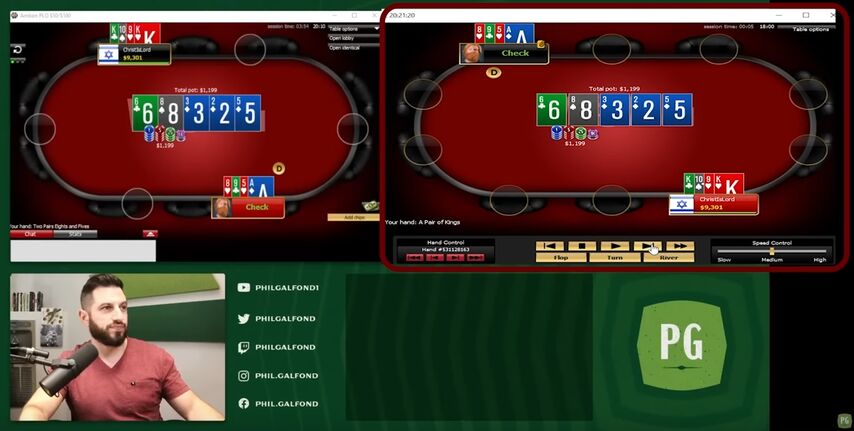
Phil raised preflop, ChristIsLord didn't 3bet. The flop was checked, Phil bet $300 on the turn and got called, the river was checked.
ChristIsLord: I just called with , although I 3-bet 100% of the time with this hand at my limits. But it's a $50/$100 game and I was like, "Oh my gosh, $900 is a lot of money!" This excuse, of course, is idiotic – and in general this is one of the reasons why I should not be at this table.
Galfond: On the turn I bet both for value and for protection, on the river an easy check with two pair. He didn't 3bet . Well, that's obviously wrong. Yes, and these limp folds... This is a play, of course, but infrequently.
Phil marked his opponent in purple after the hand. “Purple is a fish,” the vlogger laughed as he commented on the situation.
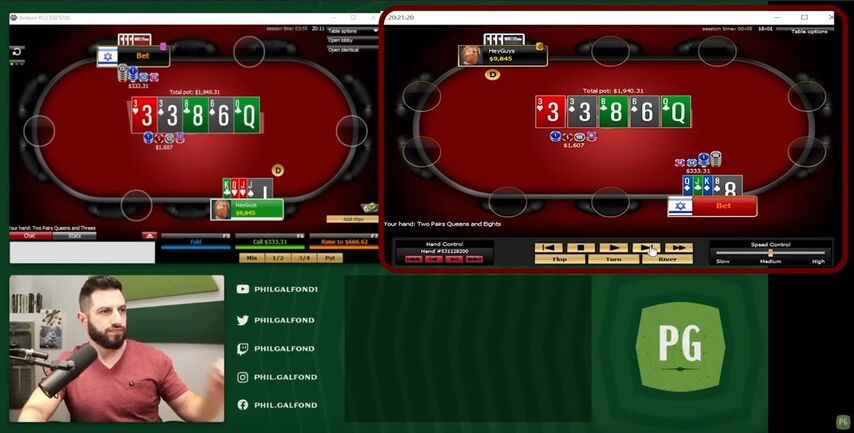
After a preflop raise, Phil c-bet 30% of the pot for $200. By this point ChristIsLord seemed to have relaxed a bit and decided to check-raise small ($504) with top pair. Phil paid, and then the turn was checked. On the river, ChristIsLord made a small block bet, 20% of the pot, with top two pair and got called.
ChristIsLord: This is a very interesting hand. I know that betting small on low paired boards is part of Phil's strategy. So I decided to see how he reacts to a check-raise and get him to fold overcards at the same time. On the turn I decided to check, expecting Phil to make a small bet.
Galfond: Here on the turn a small bet looks good... But for some reason I don't want to play like this against this opponent. I still have two overs to my jacks, the hand doesn't really need protection.
ChristIsLord: I actually learned this line from one of Phil's videos for Run It Once, and use it often myself. The bottom line is this: if, after a check-raise on the flop, the opponent checks the turn, although the board hasn't changed, he has a polar range – the nuts or full air. Against a bluff, a small bet will simply take the pot, and we can easily fold against a second check raise. And if you yourself have a full house, then there is not much to protect it from, so again, a small bet makes sense. I confess that at that moment I had not yet decided between a check-fold on the turn and a second check-raise as a bluff. My eight is a great card, and against two check-raises, Phil will definitely fold an overpair, and even with a three of a kind he will have a hard time.
Galfond (at showdown): Queen eight, hmm. So, on the flop, he raised to protect, well, ok. A bet on the river is fine.
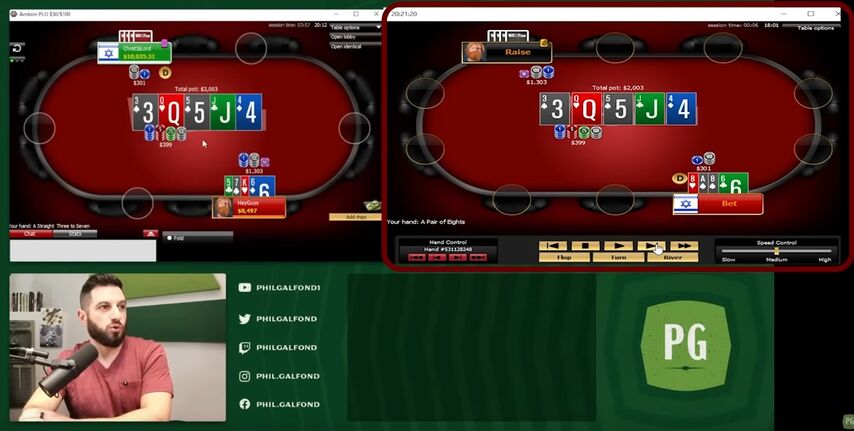
ChristIsLord limps again and Phil checks. On the flop, ChristIsLord bets $100 and gets called, and the turn is checked. On the river Galfond check-raises with the nuts and takes the pot.
ChristIsLord: I usually raise this hand, but in this case I knew I would be watching Phil's video later and wanted to hear what he had to say about my limping strategy. On the river, I have blockers for an ace, a six, and a flush draw, but I don't block top pair, so to turn this hand into a bluff is quite logical. But Phil is certainly good enough to have the nuts in his checking range too.
Galfond: His value hands on the flop are Q5 and up, which is exactly what I'm trying to get called by. But after checking the turn, he has almost none of these hands, so one can only hope that he hit something on the river. I want to get called by these hands, and at the same time they are strong enough to bet themselves. Perhaps he can come up with some kind of bluff. So check-raising with the nuts is the best line here.
Heads-up in the biggest pot of the match. Phil raises preflop, cbets $200 with trips and gets check-raised by a full house.
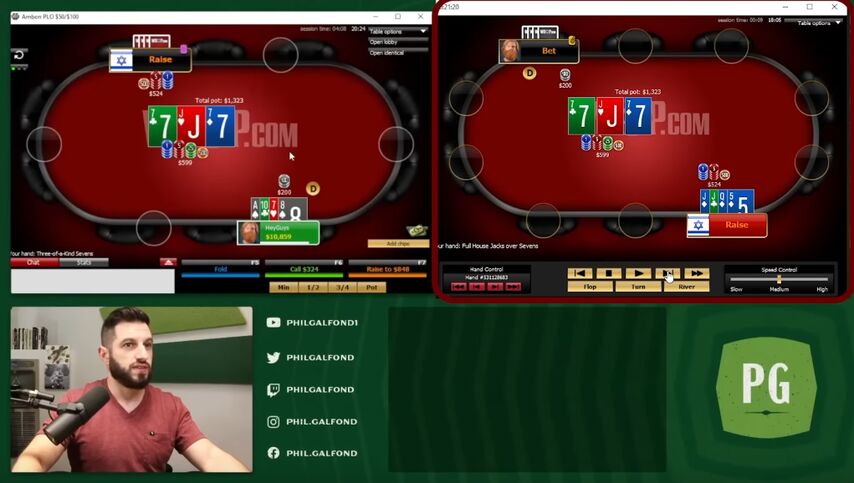
Galfond: Last time he check-raised a weak top pair on a paired board, so it's an easy call on the flop. He might have KJ or something.
ChristIsLord: Yes, Phil, that's exactly what I wanted you to think.
The turn is an 8, giving Phil a full house. ChristIsLord checks.
Galfond: Checks the turn again after the flop check-raise. Last time I didn't bet, now I will.
ChristIsLord: Of course, I checked the turn precisely because I played the same line in that recent hand.
Phil bets $500 into a $1,647 pot and runs into a second check-raise.
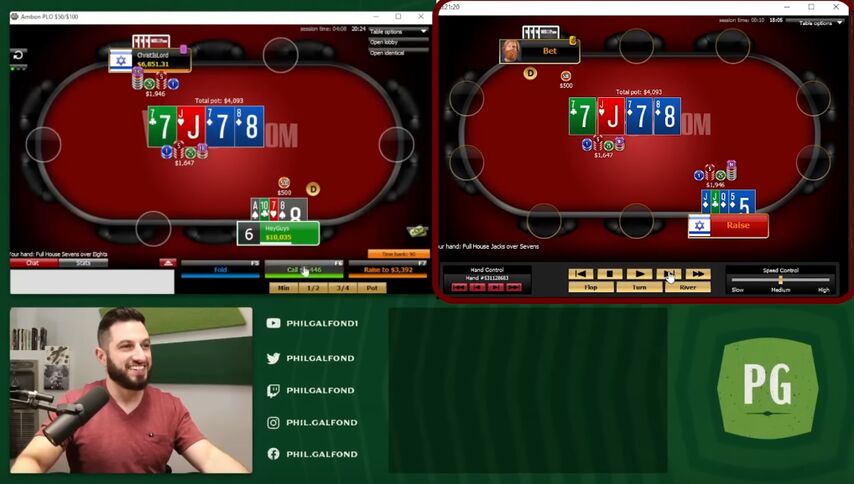
Phil calls and faces a bet on the river.
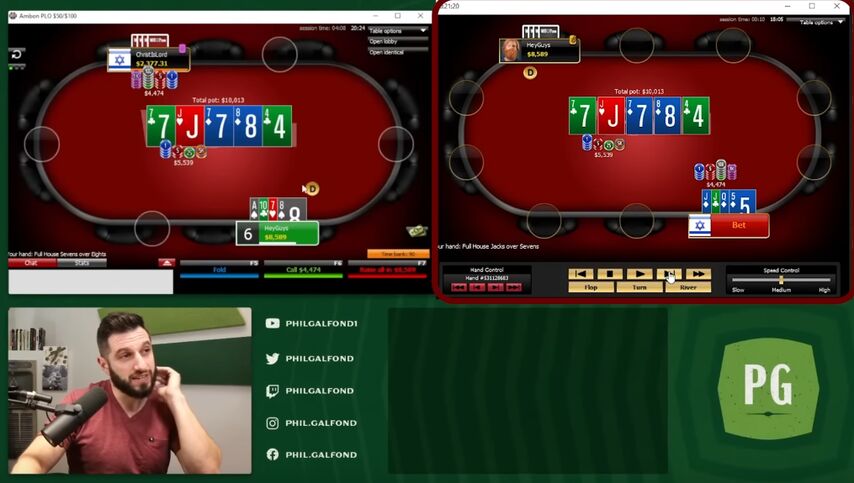
Galfond: I wonder if he remembers that recent hand where he didn't bet the turn? It's just that often when people remember a similar spot, they will play the same if the result was good then.
ChristIsLord: Phil didn't think I was bluffing, and as usual his instincts didn't fail him. But after a hand where I check-raised top pair and we got to showdown, I don't think he can fold here. He also streams to 1,000 people, folding here will look very strange to viewers (although Phil is unlikely to be particularly worried about such things). And you also need to understand that the stakes by his standards are not particularly high, so he can pay just out of curiosity. I also bet $4,474 – supposedly I could have 74.
Phil paid and lost the hand, and after the next hand, ChristIsLord went to sit out. “Oh, hit and run, okay,” Galfond shrugged.
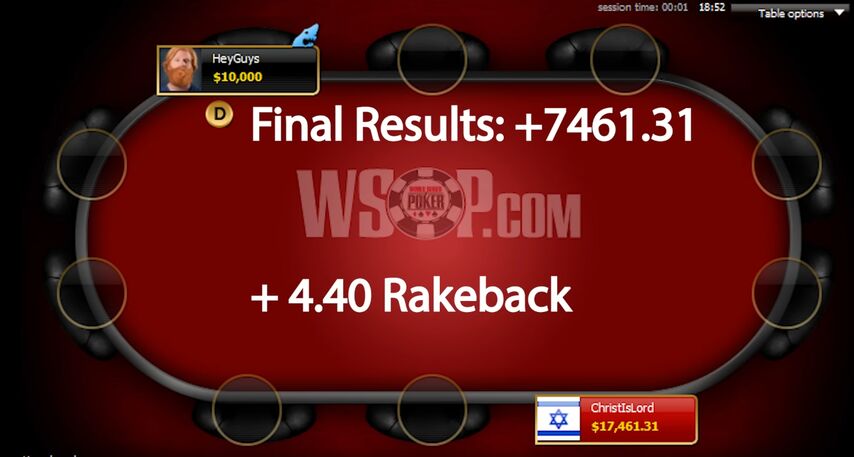
After that, the lucky Lord Christ went to confess in the comments on Phil's stream. “Sorry for the hit and run! I had a $5,000 stop win and a $20,000 stop loss. NL10K is too big for me.” Phil smiled, “It's okay! Thanks for the action, it was fun. If this was the highest stakes game of your life, then I'm glad you won, congratulations. I don't recommend doing this again, but sometimes it's great to play for a shot. If such experiments, of course, are affordable.
“The easiest $1,866 of my life,” wrote the hero after the match, a shareholder who bought 25%.
On a PokerNews podcast a few days after the video was released, Galfond was asked if he was upset when his opponent walked away with a profit. Phil was great as always.
It's not about losing, it's just that you always get upset when a match you like ends. It's hard to find heads-up action these days. And I'm really glad he won. If we lose to him, and not to another high-stakes reg, that's good. It's nice that the experience gained and the money won mean a lot to him.











